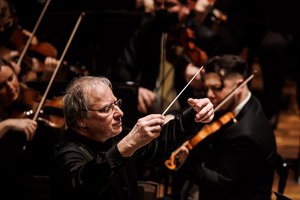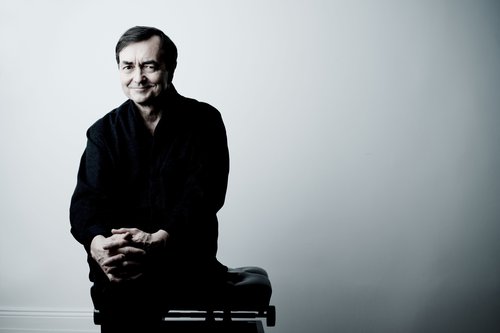In Keller’s Hungarian-accented reflections, and in his conducting of Concerto Budapest, their philosophy lives on. “We have a very strong identity together as an orchestra. Each sound has meaning. This is what I fight for every day. And it’s normal that I must push the musicians, because each of them would like to be better from one day to the next. And in pushing for more, we are searching for our own sound, and our own understanding. It’s important not to stay on the surface of the music, because when you imitate something, it’s not yours.”
via bachtrack.com

©László Mudra
Conductors like to talk in the grand manner about “my orchestra” and “my players”, perhaps forgetting that these musicians have lives of their own and even play for other conductors too. Though he does not do so, András Keller might be justified in claiming some degree of ownership over Concerto Budapest. The orchestra’s revival under his direction over the last 15 years tells a remarkable story: a parable of cultural life in eastern Europe post-1989, and yet also an exemplar of what becomes possible with the will to overcome. Their playing tells this story, too, as audiences in the UK and Ireland will be able to hear for themselves in September, when Concerto Budapest gives concerts in London, Edinburgh, Dublin, Cheltenham, Guildford and Croydon.
Keller established himself as leader and founder of the renowned string quartet bearing his name, and as a concertmaster of the Budapest Festival Orchestra and National Philharmonic Orchestra of Hungary. He had already begun to take up the baton when, in 2007, Keller went to audition for the director’s post of the Telekom Orchestra in Budapest, formed a century earlier as part of the Hungarian Post Office and previously state-owned. Up against candidates from across the world, he got the job, only to be told before long that there was no more money. Keller pushed back, as he tells me on a call from Budapest. “I’m very proud that for the next three years, the orchestra continued to receive that support. It felt like a personal success for me that this huge company which had decided not to support classical music kept some faith in me.”
The plug was finally pulled in 2010. “Should the orchestra – the second oldest in Hungary – just be left to die? I had very little time to decide, hardly more than a day.” With his own funds, and with the goodwill of his players, Keller reformed the orchestra as Concerto Budapest. A few months later, surviving at that stage by the skin of their teeth, they held a vote on the orchestra’s future. Everyone voted in. “This gave us a special strength,” Keller reflects to me.
“We showed to ourselves and to the rest of the world that we wanted Concerto Budapest to succeed.”
So they did, season by season, ironically attracting back much of the state support that the orchestra had lost in the first place, and they became a state-funded orchestra in 2012. Alongside a regular season of symphony concerts, Concerto Budapest stages an annual festival of new music (the “Day of Listening”), with performances taking place almost continuously for 12 hours. “It’s important for players to immerse themselves in different styles. I never believe in a musician who seems to be very good in new music, but cannot play Mozart.”
This breadth of ambition and vision was a hallmark of the Keller Quartet’s work, with its bracing juxtapositions of Bach and Kurtág, Ligeti and Barber, Beethoven and Knaifel, all captured for posterity by the ECM label. Just as Kurtág and Ligeti would demand every last ounce of imagination and energy from Keller and his colleagues in rehearsal, so Keller has learnt how to draw out the best from the players of Concerto Budapest. “When a quartet is rehearsing,” he reflects, “this is the most beautiful, the most intimate and the most difficult work which I can imagine. In an orchestra, it’s different. Musicians must sometimes behave like soldiers, sometimes like individuals, and sometimes in groups working together. They must find a goal, and our goal is to listen.”
Before our conversation, Keller has been rehearsing Beethoven’s Seventh Symphony. He describes getting 60 players to approach the second-movement Allegretto as though making only the smallest sound inside their own mouths. “It’s a miracle. And, by the way, I feel that making this miracle happen is more important now than ever. I deeply believe that music can save the world. This is not so much – or not only – about politics, but about the frustration of being human. And music can show people where to go, which direction to take. Even when an audience knows nothing behind the music, so to say, they can distinguish very clearly between performers who have something to say, and those who are just placing the notes. This is what I learned from Kurtág, from Ferenc Rados, from Sándor Vegh, who were on an endless search for the truth of the music. This was my education, and this is what I try to pass on.”
Concerto Budapest stated its credentials to UK audiences with a week-long tour in 2022, gathering acclaim en route for their performances of Mozart with Angela Hewitt, Beethoven’s Fifth and an electric account of Bartók’s Concerto for Orchestra. The German audiophile label Tacet has captured the Concerto in studio conditions but with a thrilling sense of immediacy, and other readers beyond Hungary and the UK may explore Concerto Budapest’s rebirth for themselves in the award-winning film of the orchestra in concert, Carpathian Rhapsody, directed by Imre Szabó Stein. It seems appropriate that the centrepiece of the orchestra’s 2023 tour should be the Eroica. Hungarian-flavoured Beethoven has a particular strength and independence of mind, demonstrated afresh by the new symphony cycle on Deutsche Grammophon conducted by Keller’s friend (and fellow ex-quartet leader) Gabor Takács-Nagy.
When preparing to conduct the Beethoven symphonies for himself, Keller addressed himself seriously to the composer’s metronome marks when learning the scores. Then he remembered a conversation with Ligeti. “I asked him, ‘Why did you write such incredible unplayable tempi in your scores?’. And he answered, ‘Because I wanted to push you to sacrifice everything you can for my music. When you do this, then you can decide which tempo sounds the best.’ And this is beautiful advice. We have to be able to play every tempo – but a metronomic tempo is inhuman. I am a great lover of the metronome, but in a way which helps me control what we’re doing.”
Keller understands better than most of us the particular richness of the Hungarian string sound which is his heritage, stretching back to the schools of Leo Weiner and Jenő Hubay. He is proud to nurture a living form of that heritage in his work with Concerto Budapest, but as he observes, this tradition comes with its own limitations. “I have a daily fight. Hungarians always accent the top of the word, as you can hear in my voice. Germans don’t do this at all” – and he draws out a pom-pom-pom like the opening of Brahms’s First. “So in Beethoven we have to find out how not to ‘play Hungarian’. It’s wonderful to keep our tone of voice in Mozart and Beethoven, a little bit, but it must fit the music.”
No less appropriately, the Eroica is prefaced in concert by Bartók’s Third Piano Concerto, for which the orchestra is joined by Pierre-Laurent Aimard. Keller is intensely happy with the pairing: “I think Bartók is the grandson of Beethoven. I don’t know any other example in musical history where two such different composers, so distant to each other in time, can be so close to each other.” He refers back to the famous 1940 Library of Congress recital where Bartók accompanies the violinist Joseph Szigeti in Beethoven’s “Kreutzer” Sonata: a timeless example of recreative fidelity to which Keller habitually directs his pupils as “a musical Bible. It’s better than any masterclass”.

© Marco Borggreve
By the time of that recital, Bartók had been exiled from his homeland by the Second World War, and the Third Piano Concerto of 1945 wears the scars of that exile in elusive ways, as an exemplar of his late style to set beside the Concerto for Orchestra and the Sixth String Quartet. After my conversation with Keller, Aimard teases out the relationship between Bartok and his material: “When he wrote his First Concerto in the middle of the 1920s, he wanted to be radical, to take his material to its most radical conclusions. Then in the Second Concerto, there is a wish to turn towards his audience. And by the time we come to the Third Concerto, we find him an immigrant, in quite a hostile environment. All this has an influence on the kind of music he writes. He is no longer a young man. He is much more prepared to compose with reference to the past. There is much less struggle.”
Aimard has worked with Concerto Budapest before, notably in a 2016 concert given to celebrate the 90th birthday of Kurtág. Does he think Bartók “speaks” Hungarian in his music, the way Keller believes that Beethoven speaks German? “I have to be modest in my answer!” he replies.
“I studied Hungarian quite seriously 30 years ago. Unfortunately I could never really speak the language properly, or only in a modest way – but I think that this experience was already good for understanding the DNA of this music, and the kinds of rhetorical and rhythmical structures within it. But in any case, the Third looks back so much to Classical-era forms.”
In 2023, the centenary of Ligeti’s birth is being celebrated worldwide, while Kurtág is still with us, and still composing, at 97. Aimard as well as Keller learned much from direct contact with both composers. In Keller’s Hungarian-accented reflections, and in his conducting of Concerto Budapest, their philosophy lives on. “We have a very strong identity together as an orchestra. Each sound has meaning. This is what I fight for every day. And it’s normal that I must push the musicians, because each of them would like to be better from one day to the next. And in pushing for more, we are searching for our own sound, and our own understanding. It’s important not to stay on the surface of the music, because when you imitate something, it’s not yours.”
By Peter Quantrill
via bachtrack.com
